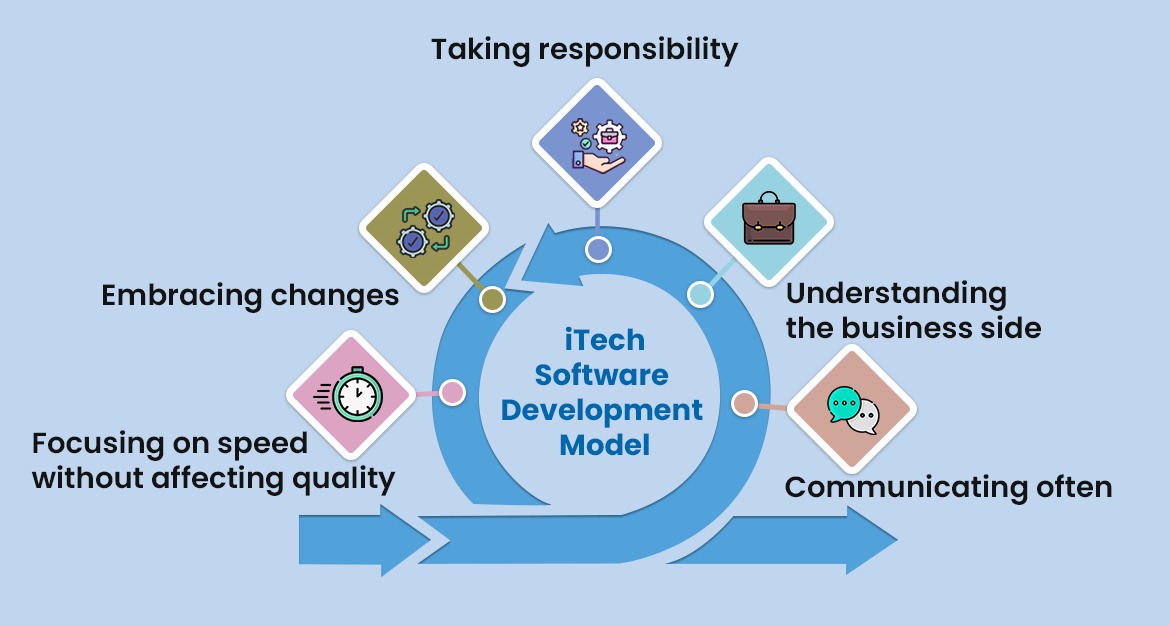
In the spring of 2020, several software development teams came together to build “COVID-19 Tracker” apps in response to the rapidly spreading coronavirus pandemic. These projects were developed and released in a matter of weeks and provided real-time information on the number of confirmed cases and deaths in different regions.
This situation amplifies why technology remains a key factor for an organization’s competitiveness. And speed is a criterion in the implementation of new technology. With the rapid advancement of technology, businesses and organizations are under pressure to keep up with the latest developments and implement them quickly in order to stay competitive. Speed is also important in order to take advantage of new opportunities and respond quickly to changes in the market or industry. This requires agility and a willingness to embrace new technologies and methods, as well as the ability to quickly adapt existing systems and processes.
As a person who’s spent my entire career not just working in technology but implementing it for business clients in a wide range of industries and managing products and teams — I really understand why speed matters.
There are several reasons why speed is important in software project delivery
Today’s customer is very reliant on digital channels. Businesses are increasingly in an innovation cycle to reimagine streamlined experiences for the digital age. No longer can projects take years to implement. Businesses need solutions quickly if they are not to lose their customer loyalty as well as attract new business.
- Competitive advantage: Speed is essential in order to stay competitive in today’s fast-paced business environment. By delivering software projects quickly, businesses can gain a competitive advantage by being the first to market with new products or features.
- Time to value: The faster a software project is delivered, the sooner the business can start reaping the benefits of the new technology. This can include increased revenue, cost savings, or improved efficiency.
- Agile development: Agile methodology for software development is becoming increasingly popular and is often used to deliver software projects quickly. The agile methodology emphasizes rapid iteration and continuous delivery, which allows for faster delivery of software projects.
- Customer satisfaction:Speed is also important for customer satisfaction. Customers want their issues to be addressed and their requirements to be met as soon as possible. By delivering software projects quickly, businesses can capitalize on innovation cycles to continuously meet customer needs and improve customer satisfaction.
- Respond to change: In today’s fast-paced world, businesses need to be able to respond quickly to changes in the market or industry. By delivering software projects quickly, businesses can respond to new opportunities and challenges in a timely manner.
At iTech, we follow agile development methodologies that have proven effective in delivering client software solutions faster. We utilize continuous integration and delivery tools along with cloud-based infrastructure. Additionally, iTech uses tools like AI automation and machine learning to optimize its development and testing processes and prioritize the most important features and functionality for its clients. Proper project management and effective communication can also help ensure that development teams are aligned and working efficiently.
Can Speed Distort Quality of Software Development?
Yes, in the debate of speed vs quality, one cannot be ignored for the other. Focusing solely on speed in software development can potentially lead to a decrease in the overall software quality.
If software development teams prioritize speed over quality, they may cut corners or neglect important testing and validation processes, resulting in software that is buggy or prone to crashes. Additionally, if teams do not take the time to properly design and plan a solution, it may be poorly architected and not scalable in the long term.
It is important to strike a balance between speed vs quality in software development. The iTech development model achieves this by implementing a process that emphasizes testing, quality assurance, and code reviews, while also setting realistic timelines and ensuring that there is clear communication between team members. Our #iSupportPortal for each client tracks every document and project status. Communicating good news is easy but our customers are informed well in time of any issues that might crop up – it is never represented as a client problem.
Having a clear vision of what is expected from the software and regular testing can help ensure that the final product meets the needs of the client and that it is stable, efficient, and easy to use.

Why new technology frameworks make it easier to deliver software projects faster than before
The pandemic was a situation that highlighted the need for speed. iTech software development team, while under the constraints of remote working, still delivered in a matter of 3 months an up-to-date telemedicine app for online doctor-patient consults. The software was developed for a Georgia-based healthcare service.
There are several reasons why it has become easier to develop software projects quicker than before. One major factor is the advancement of technology, particularly in the areas of programming languages, frameworks, and tools. Many modern programming languages, such as Python, Java, and JavaScript, are designed to be more user-friendly and efficient than older languages. Additionally, the development of frameworks and libraries has made it easier for developers to build and scale their projects, as they can reuse pre-existing code instead of starting from scratch.
Another factor is the rise of agile development methodologies, which prioritize flexibility and rapid iteration over traditional, more rigid approaches. This allows developers to quickly respond to changing requirements and deliver new features faster.
Moreover, the growth of open-source software and communities around it has led to the development of a vast array of ready-made libraries, frameworks, and tools. This means that developers don’t have to spend time developing everything from scratch, they can use pre-existing open-source libraries and focus on more important tasks.
Finally, cloud computing and the proliferation of SaaS products like RehabONE EHR and Edumate Education ERP or DocExtract the AI document digitization tool (proprietory solutions of iTech), have also made it easier for developers to develop and deploy software projects quickly and efficiently.
Improving organizational efficiency through automation or taking products to market faster cannot be a long drawn-out software development process. At the same time , speed cannot be at the cost of quality. Let us help you simplify your technology implementation and look forward to hearing from you.

Biju Narayanan
Biju is an emphatic people management leader and works by the vision that change is the door to new opportunities and innovation. As Director, he has been guiding iTech on a path of innovation for over 19 years. iTech is a full-service custom software company with a large portfolio of successful domestic and international projects including Fortune 500 organizations. Biju specializes in the healthcare, sports and logistics industries with particular focus on AI and ML. Outside of work, you may find him hitting a lethal jump smash on the badminton court and he is also a creative artist.





